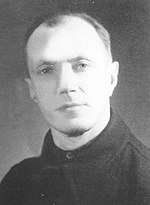How to Pronounce Józef Zwonarz
#50
Most Popular
Boost
Mar 11, 1899 Ivano Frankivsk, Ivano Frankivsk Oblast, Ukraine Died on 23 Nov 1984 (aged 85)
Polish ironworker, Righteous Among the Nations
PiscesJózef Zwonarz, Date of Birth, Place of Birth, Family, Facts, Age, Net Worth, Biography and More in FamedBorn.com

Polish ironworker, Righteous Among the Nations
Pisces